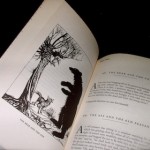THE BOOK
Word Count: 590
 He found the book one day when he was looking for a hammer. It held up the broken leg of the workbench where his father’s father’s tools were arranged on hooks on a pegboard on the wall. Beneath the bench were two narrow shelves where cans were filled with pennies he’d always meant to go through some day. He’s glad he hadn’t yet since each one was now considered rare.
He found the book one day when he was looking for a hammer. It held up the broken leg of the workbench where his father’s father’s tools were arranged on hooks on a pegboard on the wall. Beneath the bench were two narrow shelves where cans were filled with pennies he’d always meant to go through some day. He’s glad he hadn’t yet since each one was now considered rare.
He hadn’t seen a book in many years, though he remembered those his grandmother used to read to him at bedtime. They had pictures, primitive and colorful and he didn’t know until he was older that they had words.
He got down on one knee and crooked his neck to read the binding. Gold letters discolored to a broken blackish print, barely decipherable on the spine:
Aesop’s Fables ~ A Child’s Reader
He looked around for something to replace the book as prop. He found a piece of wood that seemed close enough in size. The book slid out of place but took a bit of tugging, wiggling, holding up the bench with his shoulder as he worked it out and snugged in the wood.
The book was very old and dented from its service as a crutch. The faded red fabric cover was dirty and with a rag he wiped away the years. He opened it to the first page and smiled at the illustration. Ink outlined a fox pacing beneath some overhanging fruit. Grapes, he thought, yes, sour grapes. He smiled. He found the hammer that he had been looking for and brought the book along with him upstairs.
He showed his wife and son what he had found. The little boy was very much surprised that it was made of trees. The father got on his laptop and showed the boy a film-clip of how paper had once been made.
He settled into his favorite chair and put the laptop on the floor beside him. He had a glass of wine and found he needed his reading lenses. The man struggled with the fancy text a little at the beginning, but soon he got into the rhythm and cadence of the stories. Each fable faced a drawing, and he studied the connections. His reading pace picked up as he went through the pages, though he did find that he was reading each aloud, though in a whisper. When he became aware of this, he took a sip of wine, set his lips tight together and started reading quietly. It felt unusual, peaceful yet intense, to hear the words that made up stories only in his head.
He fell asleep as he was halfway through the book. He shifted in his slumber and the book slipped off his lap and fell open to the floor. In the early morning hours his little boy came in, picked up the book and wondered in delight at the mix of black and white, text and images, pages that he needed his whole hand to turn.
The book had been many things to little minds and hands. It had been a ramp for tiny cars, a home for a plastic family. It had spent too many years as part of the workbench. It sighed when the man had pulled it from its prison. It breathed anew when it was read by him last night. But now it was its happiest, as if the sap flowed through its cells again, its leaves still green and growing. Its cover blushed a deeper red.


Thanks for bringing back the magic of books – brings back several generations worth of memories.
You’re welcome. There’s so much discussion on the survival of the book that I figured I’d take it to an apocalypse. It’s still a bit too traditional, bordering on hokey, and I want to make it edgier but it’s giving me a hard time. Maybe it wants to remain traditional, to mimic the theme…
love the last paragraph! and thank you so much for your comments, they always make my day
especially “But now it was its happiest, as if the sap flowed through its cells again, its leaves still green and growing. Its cover blushed a deeper red” reallllllly got me
Thank you so much, Amrita. But believe me, your poetry has been inspiring me towards more beauty in words.
“Gold letters discolored to a broken blackish print, barely decipherable on the spine” and “The book slid out of place but took a bit of tugging, wiggling, holding up the bench with his shoulder as he worked it out and snugged in the wood.” … great rhythm here. a wonderful piece.
Thanks, Marcus. Loved your piece yesterday BTW.